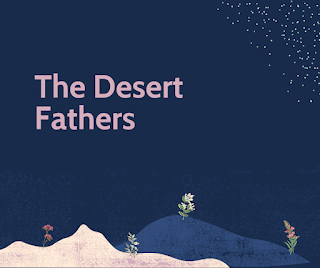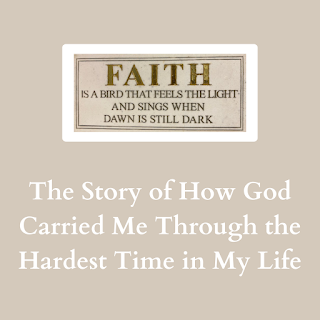Naked let us follow the naked Christ
The Fourth Century was one of the most tumultous periods in the history of the Church. It started with the great persecutions of emporer Diocletian which found their conclusion in Constantine. This man of whom both good and evil could be said ushered in a great period of peace for the Church. But while the Church may have been in to a comparably greater physical safety after Constantine¹ they still had to face the great Christological controversies of that time.
This was a century of great sacrifice and heroism but even in the midst of this it also proved to be a time of superficiality and nominalism. Many came into the Church more for the potential upgrade in social status rather than from conviction.
In the middle of this shallow surface expression of Christianity that filled the world there emerged a company of people who didn't know what to do to keep themselves from being influenced and molded by the lukewarmness of the day. And in their displeasure with the way things were going they decided to leave society all together.
The First Monks
As far as we can tell it seems to have started with a man by the name of Anthony - who at the age of 20 took Jesus' words to the rich young ruler (see Luke 18:22) literally and sold all he had and went out into the desert to seek God². Word began to spread about this man who had forsaken the world to follow Christ and others began to adopt this lifestyle that he had pioneered.
Men like this were called "monks" - which is from the greek "monos" which means "one" - because they were those who had seperated themselves from all the trappings of life to be alone before God. Which while it is important to understand God's call for believers to live in community³, it is also important to note that at our very core we are just one person before God. When we stand before Him on the Day of Judgement and as Holy Spirit connects with us in our daily lives we are at our very center alone in a desert before Him.
Let that sink in for a bit. While it may seem extreme - and is on certain levels unbiblical - for a man to leave leave all of his earthly connections with people and place so that he can live in a shack in the middle of nowhere, it is in a certain sense closer to reality than we are with the comforts and distractions of modern society.
Naked before God
One of the more famous monks of this day who was also one of the great scholars of the early Church was a man by the name of Jerome. He translated the Bible from the Hebrew and Greek into Latin creating the Vulgate, which became the main version of the Bible read in the Western world for nearly a thousand years. In this monastic sentiment to embrace our true state as humanity he was quoted as saying "Nudus nudum Christum sequi" which means "Naked let us follow the naked Christ."
We see a similar declaration in Job 1:21 where Job says "Naked I came from my mother’s womb, And naked I shall return there." And in the meditation of the life of Jesus and even for the reality of natural death that faces every person there is a real sense that to put away some of our comforts and quiet some of the noise of entertainment, news and social media in order to acquaint ourselves with the reality of our nakedness before God is very wise.
This obviously is seen in the practice of fasting. When we fast we are familiarizing ourselves with what life would be like if God didn't provide food for us. The longer we fast the more we become aware of the weakness of our body and subsequently of our mortality as created beings. Fasting shows us how weak we really are and as such it creates in us a humilty before God.
Make no Provision for the Flesh
In my recollection nearly every issue I have had in my life spiritually has been solved when the Lord showed me that I actually needed Him in that area and then gave me the ability to seek Him for assistance.
This was the great pursuit of the monk - to seek for God's strength to overcome every personal sin and spiritual obstacle that seperated them from deep fellowship with God. In leaving society they seperated themselves from many temptations but the roots of the sins of lust, greed, pride, anger and so on still remained. And it was the quest of the monk to wrestle with and overcome these trials in their lives by the strength of God.
So while it is natural to look on what these men did as extreme and unpractical I think we would suffer greatly if we completely wrote them off. For the wisdom they provide about denying one's self and putting to death the deeds of the flesh is both inspiring and instructive.
With that in view let us focus our attention on our own hearts and consider how we might put on the Lord Jesus Christ and make no provision for the flesh to gratify its desires (Romans 13:14). And let us fix our eyes on Jesus, who is the Author and Finisher of our faith (Hebrews 12:2) as well as the great Enabler of our victory over sin.
Help us to walk near to You oh Lord.
¹I say comparably greater physical safety here because there actually were further persecutions after Constantine. There were times when Arian rulers would persecute the orthodox believers and there were still martyrs that would be made in the coming centuries.
²I hope in telling the origin of Christian monasticism that I'm not misunderstood by the reader as agreeing with everything the monks did. We are called as Christians to stay in society and be both salt and light (Matthew 5:13-16) by both living out the values of our faith and by sharing our faith with our neighbors. In a similar way I don't think that God requires all of His true followers to give away all of their money. Jesus certainly called the rich young ruler to do this in Luke 18:22 but more generally He talks about stewarding our God-given resources for the purpose of doing His Will on the earth (see Luke 19:11-27, Luke 16:10-12). This is of course a call to radical generosity but also a recognition of our responsibilty to provide for our families (1 Timothy 5:8). Money should be understood as a resource that we are called to steward in a way that honors the purposes of God.
³This again would highlight another aspect in which this movement came up short. Believers are called to live in fellowship with one another (Acts 2:46) and are not to forsake the gathering together for assembly (Hebrews 10:24-25)



Comments
Post a Comment